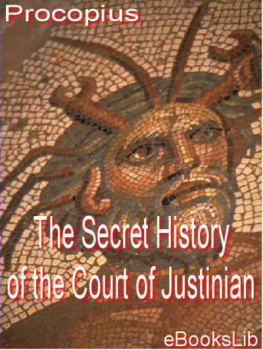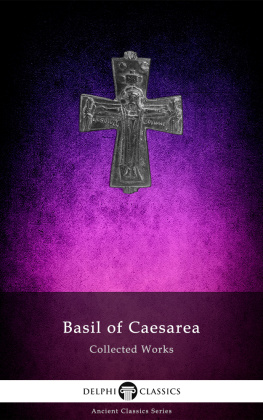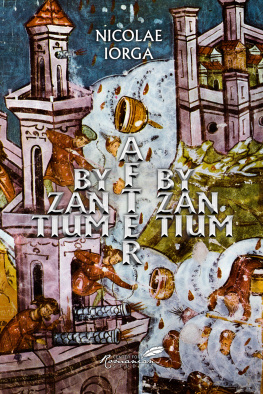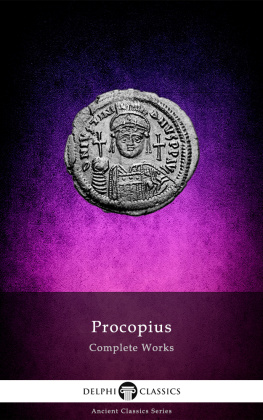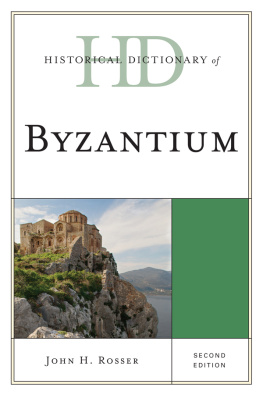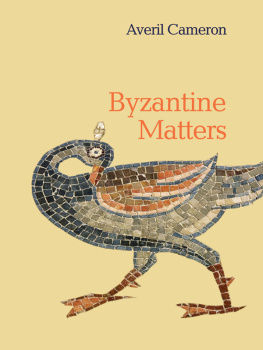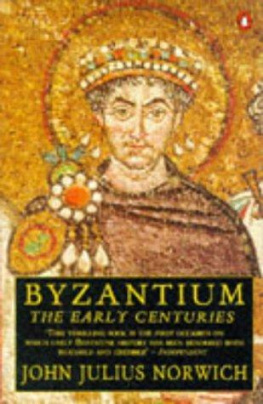You are reading a Deluxe Edition:
It was converted from clean and standard xhtml/xml files.
It uses metatags to identify content, and other data.
The available resources specific to each ebook format were used togive the reader a pleasant reading experience.
More details available at the ebookslib.com website.
Any suggestions that help us improve these editions arewelcome.
The eBooksLib.com team
2011 ebookslib.com
eBook Version
eBooksLib.com
eBooksLib, eBooksLib.com are Registered trademarks owned byeBooksDistrib S.A.R.L (LLC)
___________________
November-2011
ISBN : 978-1-4121-6980-6

PREFACE
P rocopius, themost important of the Byzantine historians, was born at Caesarea inPalestine towards the beginning of the sixth century of theChristian era. After having for some time practised as a"Rhetorician," that is, advocate or jurist, in his native land, heseems to have migrated early to Byzantium or Constantinople. Therehe gave lessons in elocution, and acted as counsel in severallaw-cases. His talents soon attracted attention, and he waspromoted to official duties in the service of the State. He wascommissioned to accompany the famous Belisarius during his commandof the army in the East, in the capacity of Counsellor or Assessor:it is not easy to define exactly the meaning of the Greek term, andthe functions it embraced. The term "Judge-Advocate" has beensuggested[1], a legal adviser who had a measure ofjudicial as well as administrative power. From his vividdescription of the early years of Justinian's reign, we mayconclude that he spent some considerable time at the Byzantinecourt before setting out for the East, at any rate, until the year532, when Belisarius returned to the capital: he would thus havebeen an eye-witness of the "Nika" sedition, which, had it not beenfor the courage and firmness displayed by Theodora, would probablyhave resulted in the flight of Justinian, and a change ofdynasty.
In 533 he accompanied Belisarius on his expeditionto Africa. On the way, he was intrusted with an important missionto Sicily. He appears to have returned to Byzantium with Belisariusin 535. He is heard of again, in 536, as charged with anothermission in the neighbourhood of Rome, which shows that, at the endof 535, he had accompanied Belisarius, who had been despatched toItaly and Sicily to conquer the territory in the occupation of theGoths. This expedition terminated successfully by the surrender ofVitiges and his captivity at Byzantium in 540.
As the reward of his services, Justinian bestowedupon him the title of "Illustrious" (Illustris), given tothe highest class of public officials, raised him to the rank of aSenator, and, finally, appointed him Praefect of Byzantium in 562.He does not, however, seem to have been altogether satisfied: hecomplains of having been ill-paid for his labours; for severalyears he was even without employment. This is all that is known ofhis life. He died shortly before or after the end of the reign ofJustinian (565), when he would have been over sixty years ofage.
His career seems to have been as satisfactory ascould be reasonably expected, all things being taken intoconsideration; but the violent hatred displayed by him againstJustinian in the "Anecdota" or "Secret History" - if the work bereally his[2] - appears to show that he must havehad some real or imaginary grounds of complaint; but history throwsno light upon these incidents of his political career.
Another question which has been much discussed bythe commentators is: "What were the religious opinions ofProcopius?"
His own writings do not decide the question; heseems to shew a leaning towards heathenism and Christianityalternately. The truth seems to be that, being of a sceptical turnof mind, he was indifferent; but that, living under an orthodoxEmperor, he affected the forms and language of Christianity. Had hebeen an open and avowed adherent of Paganism, he would scarcelyhave been admitted to the Senate or appointed to the importantofficial position of Praefect of Byzantium. His description of theplague of 543, which is exceedingly minute in its details, hasgiven rise to the idea that he was a physician, but there is noproof of this. The same thing might have been with equal justicesaid of Thucydides; or we might assert that Procopius was anarchitect, on the strength of his having written the"Buildings."
Procopius, holding a position in a period oftransition between classical Greek and Byzantine literature, is thefirst and most talented of Byzantine historians. His writings arecharacterized by an energetic combination of the Attic models ofthe affected, but often picturesque style employed by the Byzantinewriters. Although he is not free from errors of taste, he expresseshis ideas with great vigour, and his thoughts are often worthy of abetter age. The information which he has given us is exceedinglyvaluable. He had ample opportunities of observation, and his workspresent us with the best picture of the reign of Justinian, soimportant in Greco-Roman annals.
His chief work is the "Histories," in eight books:two on the Persian wars (408-553), two on the Vandal wars(395-545), and four[3] on the Gothic wars, bringingdown the narrative to the beginning of 559. The whole work is veryinteresting; the descriptions are excellent: in the matter ofethnographical details, Procopius may be said to be without a rivalamong ancient historians.
He shews equal descriptive talent in his work on the"Buildings" of Justinian, a curious and useful work, but spoiled byexcessive adulation of the Emperor. Gibbon is of opinion that itwas written with the object of conciliating Justinian, who had beendissatisfied with the too independent judgment of the "Histories."If this be the case, we can understand why the historian avengedhimself in the "Secret History," which is a veritable chroniquescandaleuse of the Byzantine Court from 549-562. Justinian andTheodora, Belisarius and his wife Antonina, are painted in theblackest colours. Belisarius, who is treated with the leastseverity, is nevertheless represented as weak and avaricious,capable of any meanness in order to retain the favour of the Courtand his military commands, which afforded him the opportunity ofamassing enormous wealth. As for Antonina and Theodora, therevelations of the "Secret History" exhibit a mixture of crime anddebauchery not less hideous than that displayed by Messalina.Justinian is represented as a monstrous tyrant, at once cunning andstupid, "like an ass," in the the words of the historian, and asthe wickedest man that ever lived. The author declares that he andhis wife are spirits or demons, who have assumed the form of humanbeings in order to inflict the greatest possible evils uponmankind. These accusations seem to be founded sometimes upon fact,sometimes upon vague rumours and blind gossip. Generally speaking,the author of the "Secret History" seems sincere, but at the sametime he shows a narrowness by confounding all Justinian's acts inone sweeping censure, and in attributing to him the most incrediblerefinements of political perversity. Critics have asked thequestion whether the author of such a work can be Procopius ofCaesarea, the impartial historian of the wars. Direct proofs ofauthenticity are wanting, since the most ancient authors whoattribute it to him - Suidas and Nicephorus Callistus - livedcenturies later.[4] But it is easy to understandthat a work of this kind could not be acknowledged by its author,or published during the lifetime of Justinian. In later times, itcirculated privately, until the lapse of time had rendered theByzantine Court indifferent to the hideous picture of the vices ofa previous age. The work is evidently that of a contemporary ofJustinian; it can only have been written by a functionary familiarwith the ins and outs of Court intrigue, who had private grievancesof his own to avenge. It is true that it sheds little lustre uponthe character of Procopius, since it exhibits him as defaming thecharacter of the masters whom he had formerly served and flattered.But this kind of inconsistency is not uncommon in writers ofmemoirs, who often revenge themselves posthumously by blackeningthe reputation of their former masters. Although the author writesunder the influence of the most violent resentment, there seems noreason to doubt that, although details may be exaggerated, the workon the whole gives a faithful picture of the Byzantine Court of theperiod.

